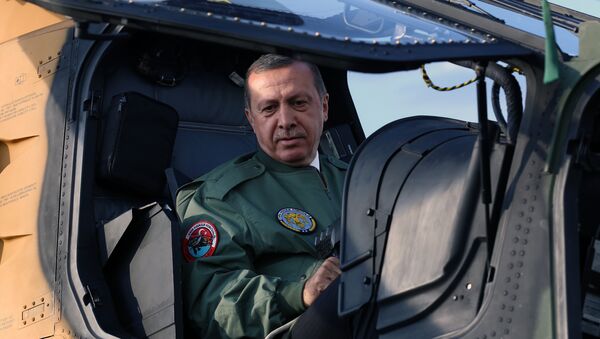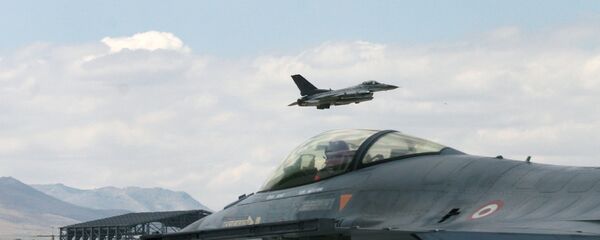Turkish President Recep Tayyip Erdogan has urged Baku to continue to pursue its offensive in Nagorno-Karabakh.
"Azerbaijan has already liberated a vast territory. I hope it will keep fighting until all its lands in Karabakh are freed," Erdogan said in an address broadcast on Twitter on Friday.
The Turkish president noted that Turkey supports "friendly and fraternal Azerbaijan in all possible ways," and would continue to do so.
No Peace Without Turkish Withdrawal
Earlier, in an interview with the Globe and Mail, Armenian Prime Minister Nikol Pashinyan said that Turkey's exit from the southern Caucasus would be a necessary condition for peace in Nagorno-Karabakh.
Pashinyan added that it was now up to Turkey's NATO allies to provide an explanation as to why Ankara is involved in the Karabakh conflict.
"Turkey's military personnel and the Turkish armed forces are directly engaged in the hostilities. Turkey's NATO allies must explain why these [Turkish] F-16 jets are shelling towns and villages in Nagorno-Karabakh and killing civilian populations," he said, referring to reports from earlier this week that an Armenian air force jet had downed a Turkish fighter. Turkey denied those reports.
Pashinyan suggested that Western countries should rethink the sale of arms to Turkey amid reports that they were being used by the Azerbaijani side in Nagorno-Karabakh.
In a series of tweets, Pashinyan also accused Ankara of returning to the South Caucasus "to continue the Armenian Genocide," and said that "Armenia and the Armenians of the South Caucasus are the last remaining obstacle in the way of continued Turkish expansion toward the North, the North-East, and the East, and the realisation of its imperialistic dream."
Armenia and the Armenians of the South #Caucasus are the last remaining obstacle on the way of continued #Turkish expansion towards the North, the North-East, and the East, and the realisation of its imperialistic dream.
— Nikol Pashinyan (@NikolPashinyan) October 1, 2020
In a recent interview with Le Figaro, Pashinyan said that Yerevan has evidence that the Turkish military was controlling Azerbaijan's military operations in Nagorno-Karabakh, and suggested that Ankara be kicked out of the Organisation for Security and Co-operation in Europe (OSCE) because of its 'aggressive and biased' position on the Nagorno-Karabakh conflict.
On Thursday, Erdogan said the OSCE Minsk Group which is responsible for negotiating a solution to the Nagorno-Karabakh conflict has no right to call for a ceasefire, and said that the organisation should demand that Armenia put an end to its "occupation" of the breakaway Azerbaijani region instead.
In his remarks Friday, Pashinyan reiterated the claims about the transfer of jihadist militias, and stressed that the population of Nagorno-Karabakh cannot be "unprotected, facing terrorists and extremists."
Nagorno-Kharabakh: Over 30 Years of Conflict
The latest bout of fighting in the contested south Caucasus region of Nagorno-Karabakh began Sunday, with each side blaming the other for starting the shooting. In five days, as many as 3,600 soldiers and civilians from both sides have been killed, with an array of military equipment, as well as civilian infrastructure, destroyed or damaged.
The Nagorno-Karabakh conflict has its origins in Soviet days. In the late 1980s, the autonomous majority-Armenian region attempted to secede from the Azerbaijani Soviet Socialist Republic and join the Armenian Soviet Socialist Republic. Azerbaijan's capital Baku tried to prevent this, and in 1991 abolished the region's autonomous status. After the USSR was dismantled in the early 1990s, Armenian-supported forces from the self-proclaimed Karabakh Republic of Artsakh waged a brutal two-year war with the Azerbaijani military, which led to the death of tens of thousands and the displacement of more than a million Armenians and Azeris across the region. A shaky ceasefire facilitated by Russia was put in place in 1994, but has been broken repeatedly in the years that followed.





